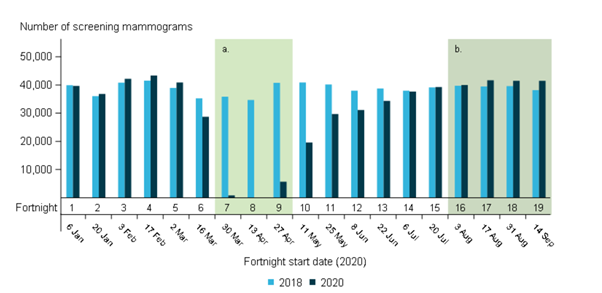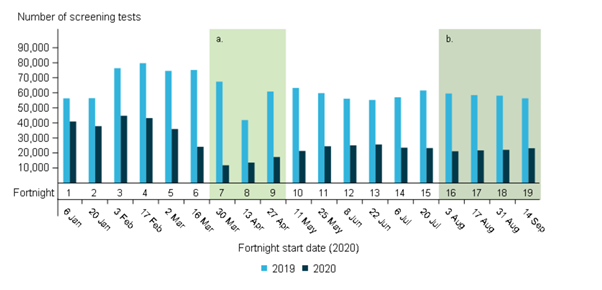Whilst general practice has maintained open doors with a COVID-safe environment for its patients throughout 2020 and made telehealth options available, we know that many patients have avoided or delayed visiting/speaking with their GP for timely consultation and advice. It’s also been harder for general practice to initiate these conversations.
Management of chronic disease has been affected and the three national cancer screening programs have also seen decreased participation, especially for breast screening.
The report from the Australian Institute of Health and Welfare (AIHW) looks at the impact of COVID-19 on cancer screening services between January and September 2020, and how these compare to the same period in the previous comparable year.
Some features of the report are shown below, however for more detailed explanation please refer to the full report here.
The impact of COVID-19 was clearest for BreastScreen Australia which experienced a drop from 74,000 in April 2018 (2018 is the comparison year as BreastScreen Australia is a biennial program) to 1,100 screening mammograms in April 2020 due to necessary temporary suspension of BreastScreen services. Since then the number of screening mammograms has increased each month.
While there were fewer cervical screening tests in 2020 compared with 2019, the true impact of COVID-19 cannot be quantified without further years of data (as 2020 is the first year impacted by the transition to 5-yearly screening).
The number of completed bowel screening tests did not correspond with COVID-19 restrictions and it is difficult to analyse the impact at this stage.
Screening aims to detect cancers early, either by detecting any early precancerous signs or by detecting cancers when they are small (and treatment options and survival prospects are better). People who are diagnosed through the three national cancer screening programs generally have much better survival prospects than those who are diagnosed when their cancers have become symptomatic and are more advanced (AIHW 2018).
Thank you general practice for your role in supporting the three national cancer screening programs, and we encourage practices to identify overdue patients for any of the three programs. If you need help, please contact pcait@snhn.org.au.
The long-term effects of delayed screening during the COVID-19 pandemic will not be known for some time. The Australian Government will continue monitoring the effects of the changing situation on cancer screening and other health services into the future.



